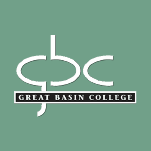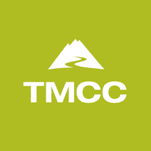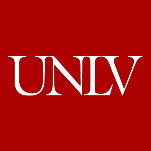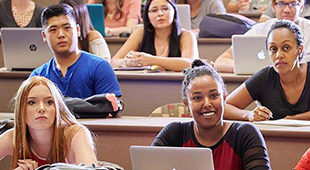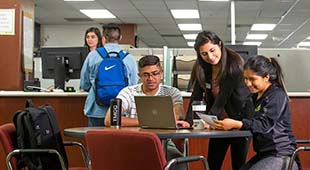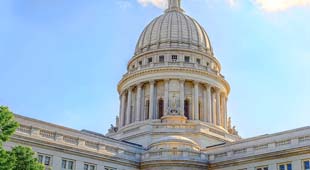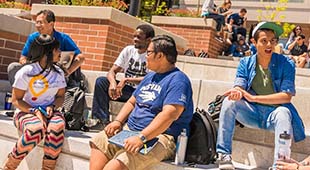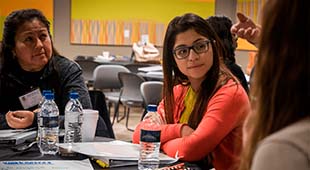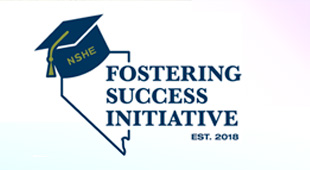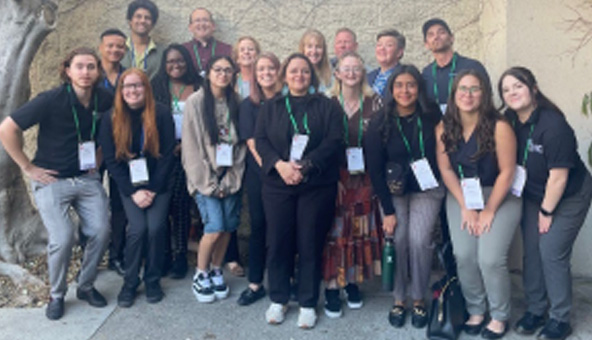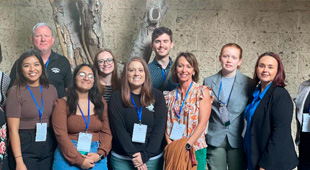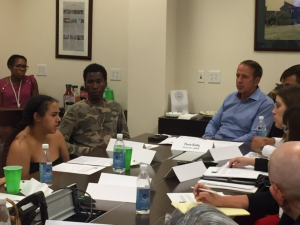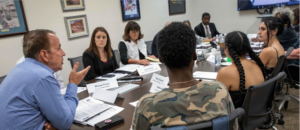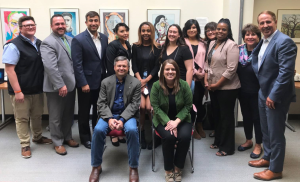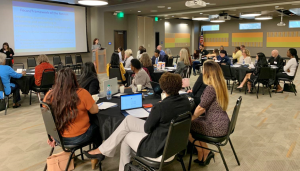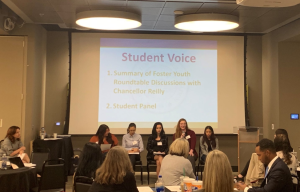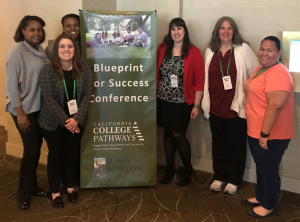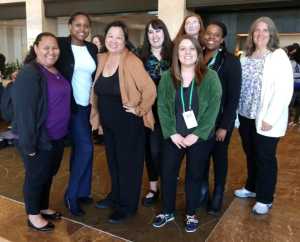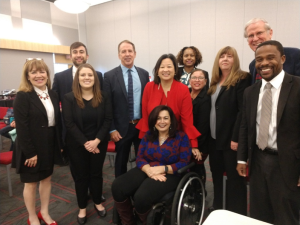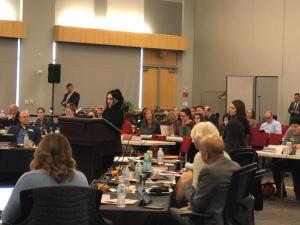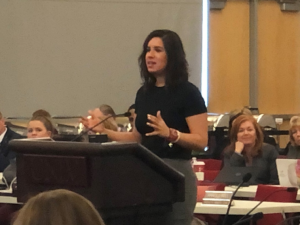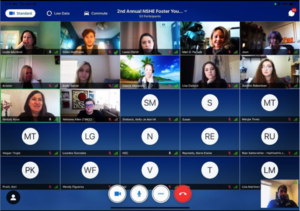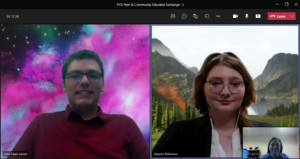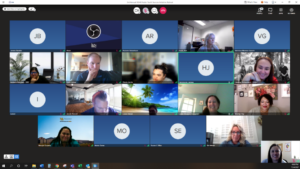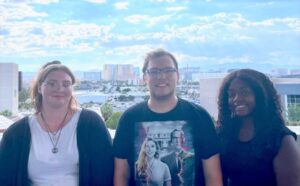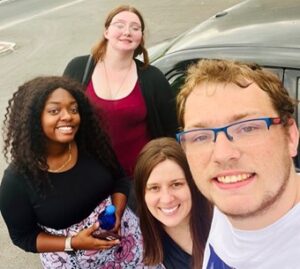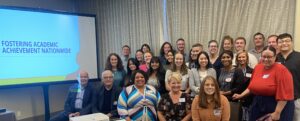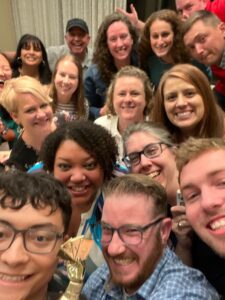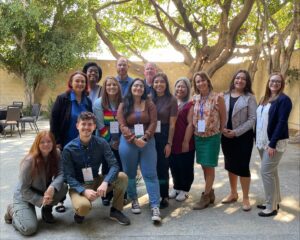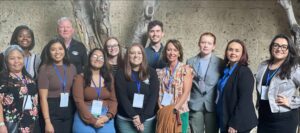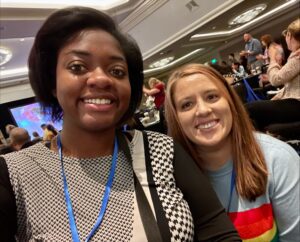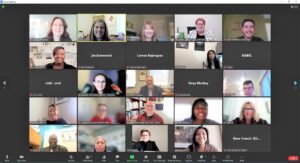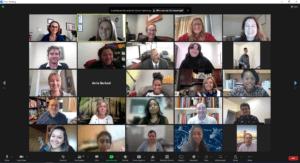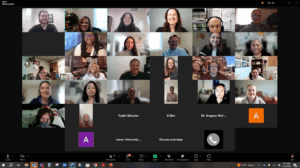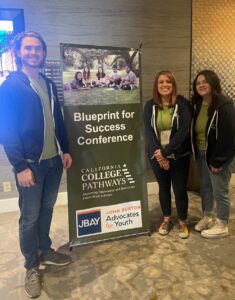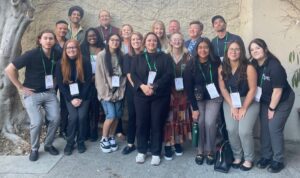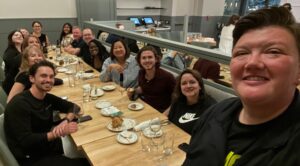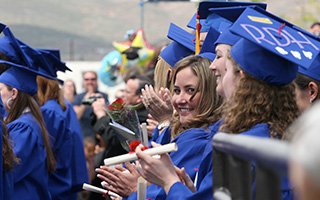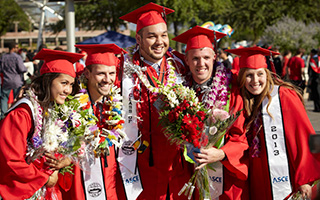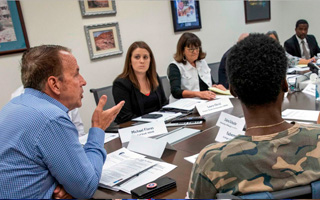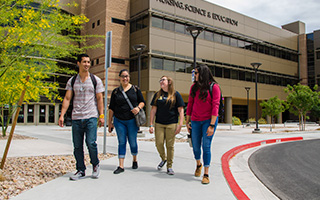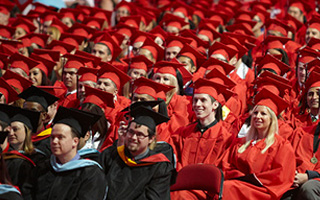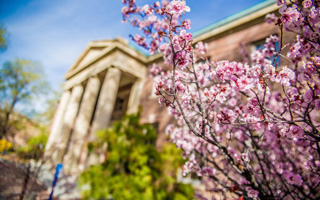
NSHE Fostering Success Initiative
Resources
Ways to Connect with the Initiative
College and Career Planning Support for High Schoolers and College Students
Financial Aid
Free Application for Federal Student Aid (FAFSA)
Foster Youth Fee Waiver
Wraparound Support for Current and Future NSHE Students
Reports
System-Level NSHE Fostering Success Initiative Contact
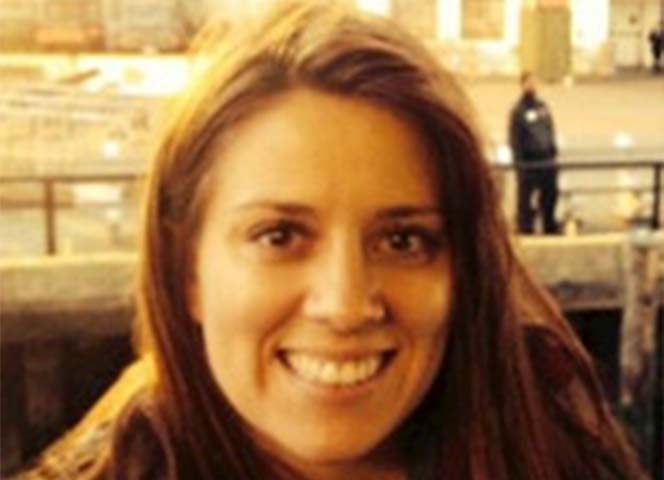
Laura Obrist
Laura relocated to Nevada in August 2018, intent on continuing to provide intensive wraparound support to current and future college students with educationally disadvantaged backgrounds and limited support systems. Laura worked at Nevada State University (NSU) for 11 months, where her desire to provide more comprehensive support to students who have experienced foster care and/or homelessness prompted her to form and chair a subcommittee focused on serving those two overlapping student populations. That work then led Laura to her position with NSHE, which was created within a year of the Nevada Board of Regents approving the NSHE Foster Youth Fee Waiver policy. Laura describes this as her “dream job.”
In her spare time, Laura enjoys cooking, gardening, reading, and spending quality time with loved ones. Favorite activities with loved ones include playing board and card games, spending time in nature, sharing delicious food, and engaging in good conversation. Laura also serves as a Court Appointed Special Advocate (CASA) in Clark County, a volunteer role supporting young people in foster care.
Laura, who serves all 7 degree-granting NSHE institutions, is the NSHE System Administration (Chancellor’s Office) contact for the systemwide NSHE Fostering Success Initiative and NSHE Foster Youth Fee Waiver. Please direct any questions related to the initiative and/or the fee waiver policy/requirements to Laura.
The designated fee waiver contacts for each of the 7 degree-granting NSHE institutions are listed below and on the fee waiver form linked above. Additionally, the designated NSHE institution contacts for campus-based wraparound support are listed below and on the initiative wraparound support flyer, some of whom also serve as the fee waiver contact for their institution. These representatives and/or Laura can also connect students with the other NSHE institution-specific contacts who are assigned to support students who have experienced foster care with specialized needs.
NSHE Foster Youth Fee Waiver Contacts
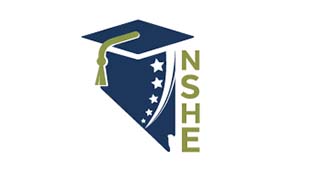
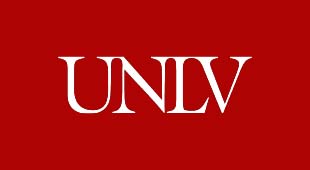
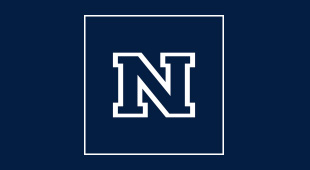
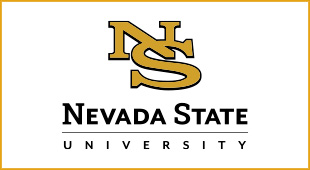
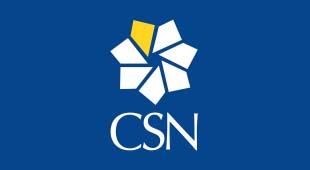
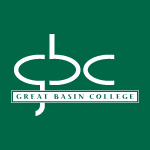
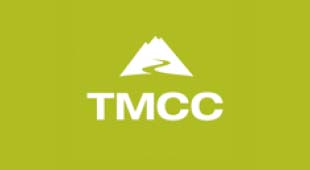

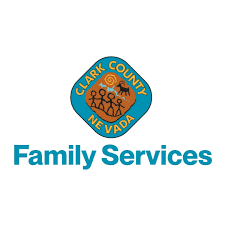
Clark County Family Services
Provides required foster care history documentation for students who were in foster care in Clark County, Nevada
DFSFeeWaiver@ClarkCountyNV.gov
Shuuanndy Alvarez
Family Services Supervisor, Independent Living
(702) 455-8517
Vanessa Benavides-Sanchez
Family Services Supervisor, Independent Living
(702) 455-0761
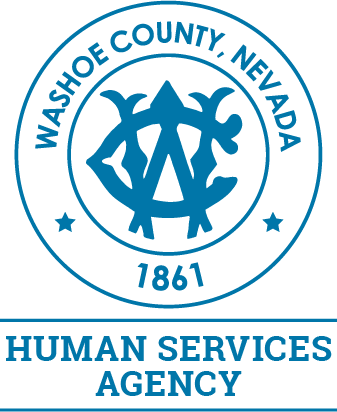
Washoe County Human Services Agency – Children’s Services Division
Provides required foster care history documentation for students who were in foster care in Washoe County, Nevada
Valerie Welsh
Foster Youth Independent Living/Transition Specialist
vwelsh@washoecounty.gov
(775) 303-7287
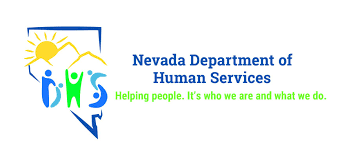
Nevada Department of Human Services Division of Child and Family Services – Child Welfare Services
Provides required foster care history documentation for students who were in foster care in ANY OTHER Nevada county (aside from Clark County and Washoe County)
NSHE Fostering Success Initiative Wraparound Support Contacts








NSHE Fostering Success Initiative Student Leaders
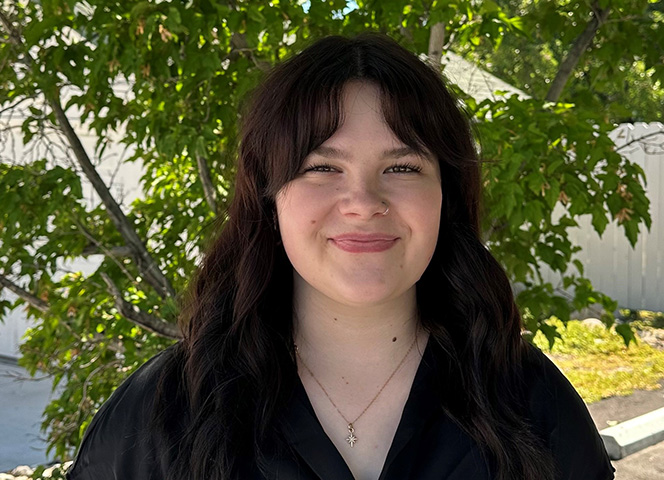
Fia Ewers
Fia was engaged with foster care-focused advocacy efforts throughout her college career at UNR, including various systemwide initiative projects. Fia was a participant in the UNR TRIO Scholars Program and the UNR Fostering the Pack program, both of which provide wraparound support services for students from educationally disadvantaged backgrounds—including those with low incomes, first-generation college students, students with disabilities, and students who have experienced foster care. Both programs provide financial assistance, mentorship, and academic support, to help students overcome barriers and succeed in higher education; and, Fia was an integral part of advocating for her not only herself, through her participation in those programs, but also advocating for her peers who are first-generation college students and/or have foster care histories. Before she was hired for the systemwide student leadership role, Fia participated in the 2021 statewide initiative retreat—alongside other NSHE students with experience in foster care, NSHE staff/faculty, and community partners—including serving as a student panelist during the event. And, in addition to being a full-time student and working part time in the chancellor’s office, Fia broadened her experience in the intersection of social work and higher education during her senior year of college—through a Bachelor of Social Work (BSW) practicum position with the UNR First-Generation Student Center. In that role, Fia served as a Peer Mentor for UNR students in First in the Pack and the TRIO Scholars Program, assisting first-generation college students with connecting to campus-based resources that support their academic success and overall wellness.
Working in partnership with 2023 & 2024 Student Voice and Resource Navigator Adam Matthews, Fia helped train NSHE employees and community partners on best practices related to supporting students with foster care histories and helped to expand the resources available through the systemwide initiative. Fia assisted with planning and executing the 2023 and 2024 statewide initiative retreats; helped design, analyze, and present the results of a voluntary Fall 2023 systemwide needs survey for NSHE students who have experienced foster care (focused on the core topics of engagement, community-building, support, and wellness); attended the 2024 Blueprint for Success Conference—alongside other NSHE student leaders with foster care histories, employees, and community partners—to bring back best practice ideas to both UNR Fostering the Pack and the statewide initiative; participated in a lived-experience professionals panel at the 2024 retreat; helped prepare materials for and/or present at other events; and completed projects focused on better supporting students with foster care histories who also have disabilities, learning challenges, and/or medical issues.
Fia earned her BSW degree (and a minor in dance), from UNR, in May 2025; and, her work on behalf of educationally disadvantaged students has been formally recognized. Fia was accepted into the National Foster Youth Institute’s 2025 Congressional Leadership Academy—including a week in Washington D.C., working with federal legislators and staffers on issues impacting the foster care community—which is a high honor in the realm of advocacy work on behalf of children, teens, and young adults who have experienced foster care. Additionally, Fia was the ONLY 2025 UNR BSW graduate to receive the school’s BSW Leadership Award, at the 2025 UNR School of Social Work graduation ceremony, which “recognizes a graduating BSW student who has demonstrated exceptional initiative, inspired others, and contributed meaningfully to the School of Social Work and broader community—through leadership roles, advocacy, or organizing.” Fia was nominated for the award by her classmates, because of the incredible range of service work that she engaged in throughout her college career—at all 3 levels of social work practice (micro, mezzo, and macro).
Fia began the UNR Master of Social Work (MSW) program, in August 2025, shortly after she graduated with her BSW and wrapped up her two service years with the initiative. Fia has multiple potential career path interests; but, regardless of the path she takes, she plans to continue advocating for young people with limited support systems throughout her social work career. Thank you, Fia, for your continued service to the social welfare field!
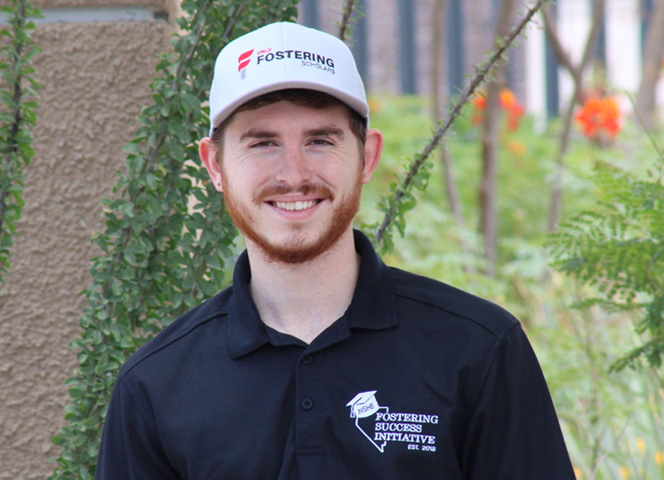
Adam Matthews
Adam was engaged with foster care-focused advocacy efforts throughout his college career at UNLV, including various systemwide initiative projects. Adam served as a UNLV student representative with lived experience in foster care during the 2nd annual (2020) and 4th annual (2022) statewide initiative retreats. Adam took on extra student leadership roles offered for those events—including engaging in a pre-retreat focus group and providing detailed feedback on the initiative’s strategic plan, prior to the 2nd retreat, and participating in the student panel and/or presentation portions of both retreats. Additionally, one of the most notable contributions that Adam made to the initiative—before he even served in his systemwide leadership role—was taking it upon himself to step up to launch UNLV’s chapter of Fostering Community, in Spring 2021, as the club’s founding president. Fostering Community is a campus-based club for students who have experienced foster care, and UNLV was the first school to launch the club concept that was designed by 2020-21 Peer and Community Educator Autumn Robertson. During his final months of college, Adam supported the club with establishing new officers, increasing membership, and implementing best practices.
Adam also served as one of just a few UNLV students with foster care histories who provided formal feedback during the hiring process for UNLV’s first Fostering Scholars Program Coordinator, in Summer 2021. UNLV Fostering Scholars is a campus-based support program that provides wraparound support and community-building opportunities for students who have experienced foster care. It was formally launched in Fall 2021, and it was the first of its kind in Nevada. Adam was a participant in the program from the time it launched until he graduated. Additionally, before he graduated, Adam attended the 2022 Blueprint for Success Conference—alongside other NSHE student leaders with foster care histories, employees, and community partners—to bring back best practice ideas to both UNLV Fostering Scholars and UNLV Fostering Community; Adam then attended that conference again in 2024, when he was serving in his systemwide initiative role.
In the system-level student/recent graduate leadership role through iFoster, Adam worked in partnership with 2023-24 & 2024-25 Peer and Community Educator Fia Ewers to help train NSHE employees and community partners on best practices related to supporting students with foster care histories and helped to expand the resources available through the systemwide initiative. Adam assisted with planning and executing the 2023 and 2024 statewide initiative retreats; helped design, analyze, and present the results of a voluntary Fall 2023 systemwide needs survey for NSHE students who have experienced foster care (focused on the core topics of engagement, community-building, support, and wellness); participated in a lived-experience professionals panel at the 2024 retreat; helped prepare materials for and/or present at other events; and completed projects focused on better supporting students with foster care histories with career planning and housing needs.
Adam has also been building his professional social work experience in other ways since he graduated from UNLV. For instance, he began working as a part-time youth and family assistant, for Child Haven—Clark County’s emergency shelter for kids in foster care—in June 2024. That role provides direct support to children in foster care—through one-on-one conversations, structured activities, and corrective behavioral support.
Based on all of his great work advocating on behalf of Nevada students who have experienced foster care, Adam was selected as one of FosterClub’s 2023 Outstanding Young Leader Award recipients. Adam was also was accepted into the National Foster Youth Institute’s 2024 Congressional Leadership Academy—including a week in Washington D.C., working with federal legislators and staffers on issues impacting the foster care community—which is a high honor in the realm of advocacy work on behalf of children, teens, and young adults who have experienced foster care.
Adam moved onto the next step in his social welfare career, shortly after completing his two years of service with the initiative, entering the UNLV Master of Social Work (MSW) program in Summer 2025. Adam plans to continue engaging in advocacy work on behalf of young people who have spent time in foster care. He is interested in clinical work, potentially as a therapist. Thank you, Adam, for your continued service to the social welfare field!
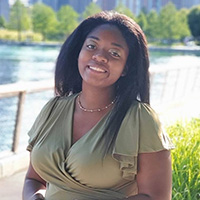
Toni Duncan
Toni has been engaged in advocacy work on behalf of the foster care population for over a decade. In high school, Toni participated in the Nevada LIFE (Leaders in Future Excellence) Youth Advisory Board (YAB), which is comprised of young leaders who have experienced foster care. Toni served as the president of Clark County’s YAB chapter—Foster And Adopted Youth Together (FAAYT)—for a year, and she later served as the statewide YAB president. Toni’s YAB officer roles gave her several great opportunities that she cherishes to this day. For example, in August 2014, Toni attended the National Pathways to Adulthood Convening in Philadelphia, PA, where she represented young people in the Nevada foster care system. Toni also represented young Nevadans in foster care during Children’s Week at the Nevada Legislature, in 2015, where she sat on the legislative floor with the late Nevada Assemblymember Tyrone Thompson and talked about foster care-related issues. Additionally, Toni spoke on behalf of the Nevada foster care population at the May 2015 First Lady’s Summit on Children’s Mental Health: Connecting the Community Dots, in Carson City, NV.
Toni continued to stay engaged with foster care-focused advocacy efforts throughout her college career at UNLV, even before she joined the system-level initiative work. Toni was one of the first participants in the UNLV Fostering Scholars Program (launched in Fall 2021), which provides wraparound support and community-building opportunities for UNLV students with a background in foster care. Through that program, Toni was not only a participant, but also a leader in helping to educate the community—both on and off campus—about the unique circumstances, challenges, and needs of students who have spent time in foster care.
During her year in the peer and community educator role, Toni helped the initiative train NSHE employees and community partners on best practices related to supporting students with foster care histories; she also helped to expand the resources available through the systemwide initiative. Toni assisted with planning and executing the 2022 statewide initiative retreat, as well as helping her student leader successors with their initial brainstorming for the 2023 retreat. And, she helped prepare materials for and/or present at other events. Toni also served on a monthly Eighth Judicial District Court OPPLA Review Panel started in early 2022, designed to improve the high school-to-college pipeline for Clark County youth in foster care. Moreover, Toni greatly enhanced the initiative’s efforts to better support her peers with a background in foster care who are also parents; and, toward the end of her year with the initiative, Toni led the effort to begin compiling information on housing stability resources for students emerging from foster care—a project that she passed on to 2023 & 2024 Student Voice and Resource Navigator Adam Matthews.
Toni graduated from UNLV, in December 2023, with a bachelor’s degree in criminal justice; and she went on to work in the social welfare field. Even after she completed her year of service with the initiative, Toni made a meaningful contribution to our work when she volunteered—at the request of a Clark County dependency judge—to share a little bit about what types of support she thinks are most critical to young people emerging from foster care, for a presentation that the initiative supported the judge with at the 87th Annual National Council of Juvenile and Family Court Judges Conference (July 2024). We are thrilled that Toni plans to stay in the social service realm throughout her career, including continuing to lend her expertise to foster care-specific causes. Thank you, Toni, for your continued service to the foster care community!
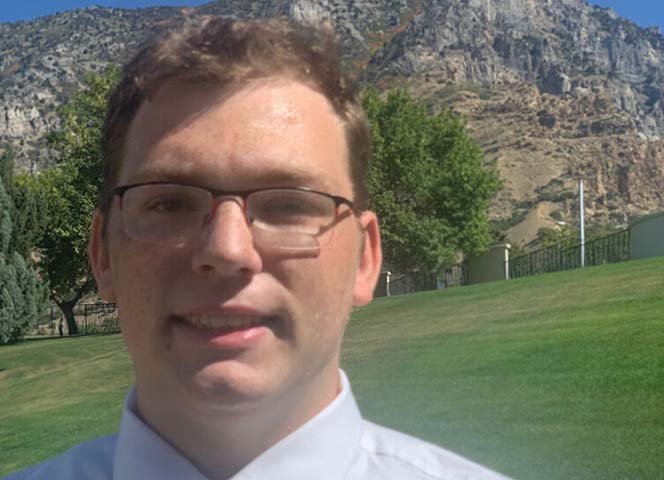
Jesse Fager-Larsen
Jesse has been engaged in foster care-focused advocacy work since high school—including serving as the secretary for Clark County’s Foster And Adopted Youth Together (FAAYT) chapter of the Nevada LIFE (Leaders In Future Excellence) Youth Advisory Board (YAB), supporting his peers in the Clark County foster care system with developing self-sufficiency and self-advocacy skills, as well as exploring future academic opportunities and engaging in community-building activities.
After transitioning to the University of Nevada, Las Vegas (UNLV), Jesse continued his advocacy work on behalf of students who have experienced foster care. He served on a UNLV H.O.P.E./Fostering Scholars Advisory Board, to provide technical assistance to the UNLV H.O.P.E. Scholars Program serving students who have experienced homelessness, as well as the UNLV Fostering Scholars Program (launched in Fall 2021) serving students with a background in foster care (Jesse was one of the first program participants). Jesse also helped kickstart UNLV’s chapter of Fostering Community, a campus-based club for students who have experienced foster care. He served as the founding vice president of UNLV Fostering Community, followed by serving as the civic engagement officer; and he supported the club with gaining membership.
During his year in the peer and community educator role, Jesse supported the University of Nevada, Reno (UNR) with launching their own Fostering Community club chapter, informed by his experience with the UNLV club. Jesse also helped train NSHE employees and community partners on best practices related to supporting students with foster care histories and helped to expand the resources available through the systemwide initiative. Jesse assisted with planning and executing the 2021 statewide initiative retreat, including leading a student presentation project that addressed the unique challenges and needs of several different foster care subpopulations. Jesse also helped prepare materials for and/or present at other events. And, he completed projects focused on better supporting students who have experienced foster care with addressing their mental health needs and getting involved in their campus and larger communities.
Jesse was accepted into the National Foster Youth Institute’s 2022 Congressional Leadership Academy—including a week in Washington D.C., working with federal legislators and staffers on issues impacting the foster care community—which is a high honor in the realm of advocacy work on behalf of children, teens, and young adults who have experienced foster care. After he wrapped up his time in the peer and community educator position, Jesse also continued to stay involved with the initiative throughout his college career, until he graduated from UNLV with a bachelor’s degree in political science (and a minor in psychology), in December 2024. At his graduation ceremony, Jesse was honored as a Winter 2024 Outstanding UNLV Graduate. Jesse has his sights set on a graduate degree, once he decides which one will best fit his career path interests; but, regardless of the path he takes, he plans to continue giving back to the community. Thank you, Jesse, for your continued community service!
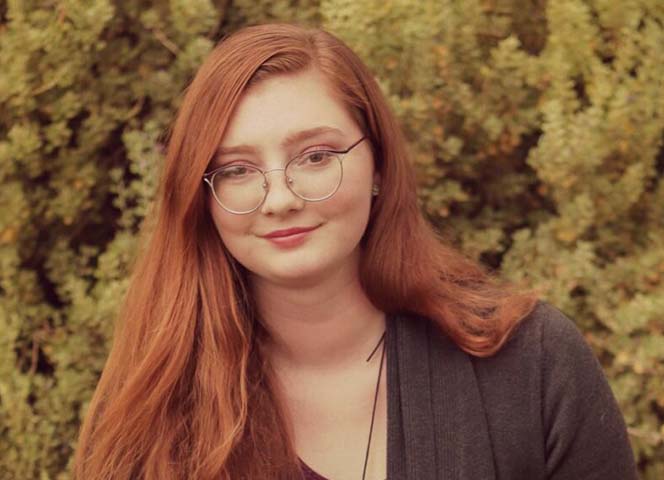
Autumn Robertson
Autumn has been an advocate for students who have experienced foster care since high school—when she served as an officer for Clark County’s Foster And Adopted Youth Together (FAAYT) chapter of the Nevada LIFE (Leaders In Future Excellence) Youth Advisory Board (YAB). That role then led to her serving a one-year term as the statewide ambassador for the Nevada Division of Child and Family Services (DCFS), during her senior year. Through that position, Autumn engaged in self-sufficiency, self-advocacy, and education support work on behalf of young people in foster care across the state. Autumn got involved with the NSHE Fostering Success Initiative through her DCFS ambassador position, in a variety of ways. Autumn participated in the very first statewide initiative retreat (2019)—as the sole high school student representative—along with NSHE students with experience in foster care, NSHE staff/faculty, and community partners. Autumn also attended the 2019 Blueprint for Success Conference—a nationally renowned conference focused on postsecondary education preparation, transition, and persistence support for students who have experienced foster care—alongside NSHE employees and community partners.
After transitioning to the University of Nevada, Reno (UNR), Autumn continued her advocacy work on behalf of students who have experienced foster care. Autumn was a participant in the UNR Fostering the Pack program that serves students who have experienced foster care (launched in Spring 2022); and, she served as a Peer Mentor to other Fostering the Pack participants. Autumn also served on the Nevada Fostering Higher Education Committee—from the time it launched in early 2020, until she graduated from UNR.
During her year in the peer and community educator role, Autumn helped train NSHE employees and community partners on best practices related to supporting students with foster care histories and helped to expand the resources available through the systemwide initiative. Autumn assisted with planning and executing the 2020 statewide initiative retreat, including leading a student presentation project that addressed the “DOs and DON’Ts” of serving students with a background in foster care. Autumn also helped prepare materials for and/or present at other events. And, she completed projects focused on better supporting students who have experienced foster care with understanding and implementing the fundamentals of financial literacy. Additionally, Autumn helped design, analyze, and present the results of a voluntary Fall 2020-Spring 2021 systemwide needs survey for NSHE students who have experienced foster care (focused on common barriers to thriving in school and in life, and what students need to address them). She also designed/launched the systemwide Fostering Community club concept, so that NSHE students with a background in foster care can more easily build community with other students with foster care histories. When Autumn began the systemwide position with NSHE, she said “it’s a great honor to be the first in this position and I hope to make it something great.” Well, she certainly made it something great!
Autumn continued to serve the Nevada foster care community after she completed her one-year term with the systemwide initiative—through her continued involvement with the initiative and through other foster care-focused roles within the community. For instance, Autumn served for a year in the Foster Care Liaison role for the Children’s Advocacy Alliance, a close community partner in the initiative work. Based on all of her great work advocating on behalf of Nevada students who have experienced foster care, Autumn was selected as one of FosterClub’s 2022 Outstanding Young Leader Award recipients.
Autumn graduated from UNR, in December 2023, with a bachelor’s degree in economics (and minors in sociology and statistics). Autumn then moved onto the next step in her economics career, shortly after graduating from UNR, by pursuing a master’s degree in economics. Autumn plans to continue engaging in advocacy work on behalf of young people who have spent time in foster care, using her knowledge of/skills in financial literacy to help build stronger financial literacy knowledge/skills in young people emerging from foster care. Thank you, Autumn, for your continued service to the foster care community!
Initiative Overview
In September 2018, the Nevada System of Higher Education (NSHE) launched its systemwide Foster Youth Success Initiative (renamed in 2022, as the Fostering Success Initiative) when the Nevada Board of Regents unanimously approved the NSHE Foster Youth Fee Waiver—a course registration fee waiver permitting qualifying NSHE undergraduate students to register for classes without being charged course registration or certain laboratory fees—thereby increasing college access for specific students who have experienced foster care.
Shortly thereafter, NSHE applied for and received six years of private grant funding, totaling $1.2 million, from the Walter S. Johnson Foundation—which funds projects focused on improving wellbeing, economic stability, and educational opportunity for young people with a background in foster care and other systems-involved youth. The system-level private grant funding began in March 2019 and ended in June 2025.
A portion of the grant funding was allocated toward the salary and fringe benefits for a system-level employee, hired to facilitate the successful implementation and coordination of the initiative—including its fundamental fee waiver component—across NSHE’s seven degree-granting institutions. The grant funding also supported with other system-level initiative needs and activities—such as the systemwide peer and community educator student leadership position, specialized professional development opportunities for NSHE employees and community partners, and promotional materials for the fee waiver and other initiative resources.
During the first annual initiative retreat, in September 2019, the initiative’s vision was collaboratively developed by the 38 stakeholders in attendance, including five students with lived experience in foster care. After a full day of collaborative brainstorming, the retreat participants came up with the following vision statement:
Our vision is to build a comprehensive, sustainable, and permanent education support system for Nevada students who have experienced foster care—from secondary education completion, to postsecondary education attainment, to a career path.
Several months later, the 2019 retreat participants became the core members of the Nevada Fostering Higher Education Support Network that the system-level employee formally established in early 2020—a coordinated statewide network of NSHE student leaders with foster care histories, NSHE institution employees, child welfare professionals, K-12 educators and administrators, legal services providers, court representatives, workforce professionals, and other stakeholders—some of whom are already well-versed in the unique circumstances, challenges, and needs of young people who have experienced foster care, and all of whom are committed to continually engaging in culturally humble, best practice-focused learning opportunities in order to effectively serve young people with a background in foster care with their postsecondary education-related challenges, needs, and long-term education and career goals.
The core network members who consistently engage with the initiative make up the Nevada Fostering Higher Education Committee. The committee meets quarterly, alternating between a statewide and regional format.
With the initiative’s vision consistently in mind, our mission is to more effectively recruit, support, and retain students who have experienced foster care; and the fee waiver is a key component in achieving that goal for qualifying students (you can learn more about the fee waiver eligibility requirements and benefits in this Who, What, When, Where, & Why Fact Sheet). However, the initiative serves any current or prospective NSHE student with a background in foster care—regardless of when or where they were in foster care, or their eligibility for the fee waiver or other financial aid. NSHE is dedicated to providing both financial and wraparound support, as we know that providing funding for students who have experienced foster care is just one crucial step in ensuring their college success.
NSHE System Administration hired a full-time, system-level employee in July 2019, to facilitate the successful implementation and coordination of the initiative—including its fundamental fee waiver component—across NSHE’s seven degree-granting institutions. The position was initially titled Foster Youth Ambassador; but the role was renamed in 2024, to Manager, Fostering Success Initiative—to better align with the initiative’s 2022 renaming, which made it more person-first and age-inclusive. The manager is dedicated to achieving the initiative’s mission and ultimate vision, in collaboration with the statewide Nevada Fostering Higher Education Support Network and its core members who make up the statewide Nevada Fostering Higher Education Committee.
In order to ensure that NSHE is working effectively with young people with experience in foster care, the system-level manager frequently consults with student leaders with a background in foster care and other members of the network/committee who have expertise in the unique circumstances, challenges, and needs of this underserved student population and/or expertise in various higher education topics. The manager serves as the primary point of contact for, and liaison between, all of the NSHE institutions and community partners. The manager also responds to inquiries from prospective and current NSHE students who have experienced foster care (and their support people), providing them with resources and directing them to campus-based staff/faculty and community-based service providers who can further assist them with various needs.
Additionally, the system-level manager leads the statewide network—particularly the core members who make up the statewide committee—in the development and implementation of effective postsecondary education planning, preparation, access, transition, and persistence practices. These practices are formulated to assist young people who have experienced trauma, educational instability, inadequate financial resources, and limited support systems; and the approach employed is twofold:
- Increasing financial aid access and utilization for all prospective and current NSHE students with a background in foster care—particularly in the form of the NSHE Foster Youth Fee Waiver (for eligible current and former dependents of the Nevada foster care system); federal, state, and institution-specific grants; and scholarships; AND
- Improving and expanding postsecondary education-specific wraparound support for Nevada students who have experienced foster care—including students in the college preparation and transition stages, as well as continuing college students.
As a system-level employee, the manager employs three core strategies in facilitating the statewide network and supporting its members with achieving success, each of which includes several key focus areas designed to increase postsecondary education attainment for young people who have experienced foster care:
- Resourcing (building knowledge) – Creating and/or disseminating specialized resources—in collaboration with student leaders and experts in the field of higher education support for students with a background in foster care—that assist educators, community-based professionals, and elected officials with better understanding the following:
- The unique circumstances, challenges, and needs of students with foster care histories;
- The financial and wraparound support already available to help support students who have experienced foster care to reach their college goals; and
- The financial and wraparound support still needed to more effectively assist current and prospective college students with experience in foster care.
- Networking (building social capital) – Facilitating consistent opportunities for the statewide network to connect with each other and other professionals throughout the country—in order to learn from each other, share ideas, and collaborate on projects designed to better support students who have experienced foster care.
- Supporting (building skills) – Identifying and providing opportunities for perpetual, culturally humble engagement in best practice-focused learning/training pertaining to effective methods for supporting students with foster care histories.
These core strategies, informed by national best practices in supporting students who have experienced foster care with reaching their college goals, better equip the statewide network to achieve the initiative’s mission and ultimate vision.
In adopting best practices and strengthening resources and support services that are tailored to students with foster care histories, NSHE seeks to:
- Improve its own ability to effectively support young people who have experienced foster care with college planning, preparation, access, transition, and persistence activities;
- Expand the capacity of other systems serving this population to assist with college-focused activities; and
- Build stronger career pathways for students with a background in foster care.
The Nevada Fostering Higher Education Support Network is a coordinated statewide network of NSHE student leaders with foster care histories, NSHE institution employees, child welfare professionals, K-12 educators and administrators, legal services providers, court representatives, workforce professionals, and other stakeholders (including some community partners in other states and national partners who are dedicated to supporting Nevada with its efforts to better serve students with experience in foster care in the higher education space).
Statewide network members, particularly the core members who make up the Nevada Fostering Higher Education Committee, engage in three key activities that align with the system-level core strategies and promote the success of our students who have experienced foster care:
- Individualized direct coaching that centers the young person as the expert in their own experiences and needs, builds trust, and fosters self-advocacy and independent living skills;
- Tailored resource and/or support service provision, within campus- and community-based settings (including “sense of belonging” opportunities); and
- Timely and appropriate advocacy that assists in removing barriers.
Initiative Growth Timeline
2018
Board of Regents launched the systemwide Nevada System of Higher Education (NSHE) Fostering Success Initiative (formerly known as the NSHE Foster Youth Success Initiative) when they unanimously approved the NSHE Foster Youth Fee Waiver—a course registration fee waiver permitting qualifying NSHE undergraduate students to register for classes without being charged course registration or certain laboratory fees—thereby increasing college access for specific students who have experienced foster care.
2019
In February 2019, the Walter S. Johnson Foundation awarded NSHE System Administration an initial one-year $200,000 grant, to hire a system-level employee to facilitate the successful implementation and coordination of the initiative—including its fundamental fee waiver component—across NSHE’s seven degree-granting institutions, and to support with other system-level initiative needs.
NSHE System Administration began its one-year $200,000 Walter S. Johnson Foundation grant cycle on March 1, 2019. The grant funds were allocated toward the salary and fringe benefits for a system-level employee, as well as other system-level initiative needs.
In July 2019, NSHE hired system-level employee Laura Obrist to facilitate the successful implementation and coordination of the initiative—including its fundamental fee waiver component—across NSHE’s seven degree-granting institutions. The role is tasked with leading the development and implementation of effective postsecondary education planning, preparation, access, transition, and persistence practices that are formulated to assist young people who have experienced trauma, educational instability, inadequate financial resources, and limited support systems—focusing primarily on securing financial aid and wraparound support for students.
In Fall 2019, the systemwide initiative launched its website and X/Twitter account, to get the word out about activities and resources.
In an effort to ensure that the system office was engaging, first-hand, with students who have experienced foster care, then-Chancellor Thom Reilly hosted two regional roundtable discussions during the Fall 2019 semester. From these discussions, 14 key recommendations addressing postsecondary education access/success barriers were identified for Nevada education and community providers. The student feedback from the roundtable discussions was then disseminated to the college/university presidents, in a memo, as well as used to inform the development of the initiative’s strategic plan.
The initiative hosted its first annual retreat in September 2019. During the retreat, NSHE employees, NSHE students with lived experience in foster care, and community partners worked collaboratively to build a more cohesive statewide learning community focused on supporting students who have experienced foster care in accessing and thriving in college; this included developing a strategic plan for the initiative.
In October 2019, a delegation of NSHE employees, community partners, and one high school senior in foster care who was admitted to/preparing to enroll at the University of Nevada, Reno (UNR) attended the California College Pathways Blueprint for Success Conference—a nationally-renowned, biannual event focused on supporting students who have experienced foster care with postsecondary education enrollment and success.
In November 2019, the Walter S. Johnson Foundation awarded Truckee Meadows Community College (TMCC) an initial 18-month $30,000 grant, to improve housing stability and peer mentorship support for its students who have experienced foster care.
In December 2019, the system-level employee provided the Nevada Board of Regents with the first official update on the initiative’s progress, including the initial NSHE Foster Youth Fee Waiver utilization numbers (for Fall 2018, Spring 2019, and Fall 2019).
2020
Truckee Meadows Community College (TMCC) began their 18-Month $30,000 Walter S. Johnson Foundation grant cycle on January 1, 2020. TMCC utilized their funds to improve housing stability and peer mentorship for its students who have experienced foster care.
The initiative formally established the Nevada Fostering Higher Education Support Network in January 2020, which includes a core group of NSHE employees, students, and community partners that comprises the Nevada Fostering Higher Education Committee. The committee meets quarterly, alternating between a statewide and regional format.
The initiative developed the Nevada Fostering Success Financial Aid Toolkit in early 2020, which went live on the initiative website in May 2020.
In February 2020, the Walter S. Johnson Foundation awarded NSHE a second grant—in the amount of $400,000 over two years—to sustain the system-level position and provide for other system-level initiative needs.
In February 2020, the Walter S. Johnson Foundation awarded the University of Nevada, Las Vegas (UNLV) a $200,000 grant to launch a campus-based support program dedicated to serving students who have experienced foster care. Due to pandemic-related hiring delays, UNLV was granted an extension on their grant term and was able to hire a coordinator the following summer (in June 2021).
NSHE System Administration began their 2-Year $400,000 Walter S. Johnson Foundation grant cycle on July 1, 2020. The grant funds were, once again, allocated toward the salary and fringe benefits for the system-level employee, as well as other system-level initiative needs.
UNLV began their two-year $200,000 Walter S. Johnson Foundation grant cycle on July 1, 2020. The grant funds were allocated toward launching a campus-based support program dedicated to serving students who have experienced foster care. Due to pandemic-related hiring delays, UNLV was granted a 1-year extension on their grant term (through June 2023) and was able to hire a program coordinator the following summer (in June 2021).
In July 2020, the system-level employee facilitated an expert panel on best practices in providing campus-based wraparound support to students with experience in foster care, for University of Nevada, Las Vegas (UNLV) staff/faculty. The panel featured a UNLV student who had experienced foster care, a child welfare professional with Clark County Family Services, and four California-based students/professionals who have participated in and/or run campus-based support programs for this student population. Five out of six panelists had lived experience in foster care.
To accomplish the initiative’s objective of providing students who have experienced foster care with the support needed to flourish, it is important to identify and serve any student in that category, regardless of fee waiver eligibility.
This is critical for the purposes of accurately tracking key data, increasing fee waiver utilization, and connecting students to resources/services. To this end, the initiative worked with institutional presidents and registrars during the first half of 2020 to add a standardized foster care identification question to all NSHE applications for admission.
The question was fully implemented by all 7 degree-granting NSHE institutions in time for the Fall 2021 admission cycle. The system-level employee continually works with the institutions to identify and serve these students through targeted outreach efforts.
The initiative established the systemwide peer and community educator position—a part-time student leadership role with the initiative—in mid-2020. The role was intentionally designed to give new students the opportunity to apply each academic year—to allow multiple students to have the opportunity to hold the position, and to support students in moving onto other resume-building opportunities after 1-2 years of service. The initiative’s first peer and community educator began the role in August 2020, for the 2020-21 academic year. In line with national best practices that reiterate the importance of youth-informed and/or youth-led work when serving young people with experience in foster care, this student leadership role has been an initiative cornerstone.
In Summer 2020, the initiative secured one-time approval, due to the onset of COVID-19, to reallocate system-level grant funds directly to NSHE students with foster care histories. NSHE also partnered with Foster Love (formerly named Together We Rise) to secure and execute their own Walter S. Johnson Foundation grant, specifically serving Nevada students who have experienced foster care through their COVID-19 Rapid Response program. The partnership began in Fall 2020 and funding for unmet needs was disbursed through July 2021.
In Fall 2020, the system-level employee and the 2020-21 peer and community educator launched an Instagram account for the initiative, expanding the online presence after establishing this website and X/Twitter account in mid-2019.
In Fall 2020, the initiative developed and widely disseminated a quick-reference guide providing a financial aid overview and detailed FAFSA completion instructions for Nevada students with foster care histories. The guide is updated annually; and it is consistently disseminated and used in workshops/presentations.
The initiative hosted its second annual retreat in November 2020. During the retreat, NSHE employees, NSHE students with lived experience in foster care, and community partners worked collaboratively to build a more cohesive statewide learning community focused on supporting students who have experienced foster care in accessing and thriving in college; this included hearing feedback from students on the strategic plan progress and working collaboratively to generate initiative goals for the next year.
2021
In June 2021, the University of Nevada, Las Vegas (UNLV) hired Coordinator Heather Richardson to launch the UNLV Fostering Scholars Program, marking NSHE’s second full-time position serving students who have experienced foster care, and first full-time campus-based position and support program dedicated to students with a background in foster care. Utilizing the $200,000 in funding support from the Walter S. Johnson Foundation that was secured in 2020, and an initial internal funding commitment of over $100,000, UNLV went through the hiring process for the Fostering Scholars Program coordinator position in Spring 2021, hired in Summer 2021, and began providing formalized wraparound support services for UNLV students with foster care histories in Fall 2021. In addition to the coordinator role, the program is supported by two UNLV Master of Social Work practicum students.
In Fall 2021, the University of Nevada, Reno (UNR) invested internal funds in a 2021-22 graduate assistant position dedicated to serving first-generation college students, including students with experience in foster care.
The University of Nevada, Reno (UNR) was invited to submit a Letter of Inquiry for a $200,000 grant through the Walter S. Johnson Foundation in Summer 2021, based on their targeted internal efforts to formalize and expand support for students with experience in foster care. They were then invited to submit a formal grant proposal to the Foundation, which was approved in November 2021.
Truckee Meadows Community College (TMCC) was invited to apply for a three-year $225,000 Walter S. Johnson Foundation grant in November 2021, which was approved in December 2021.
From April through July 2021, NSHE utilized some grant funds to pay for a specialized 16-week virtual Level I Fostering Success Coach Training. 18 NSHE employees and community partners successfully completed the training and thereby became Level 1 Certified Fostering Success Coaches. Since the initial group completed the Level I training, additional NSHE employees and community partners who have joined the initiative work have also successfully completed the training and become Level 1 Certified Fostering Success Coaches. This practice persists as new people continue to join the work, as funding allows.
The NSHE Department of Academic and Student Affairs finalized and posted the first biennial fee waiver and program report, in August 2021. The system-level employee then presented the report to the Nevada Board of Regents, in September 2021. The report provides a background on the foster care population; outlines the total number of students who utilized the fee waiver and the total cost to the NSHE institutions during the 2018-19, 2019-20, and 2020-21 academic years; introduces the student completion measures that NSHE will track moving forward; and provides an overview of the initiative’s milestones in its first couple of years.
The part-time 2020-21 peer and community educator and the full-time system-level employee conducted a systemwide needs survey that NSHE students who have experienced foster care were invited to complete from December 2020 through June 2021. The survey collected information about key barriers that have negatively impacted students’ ability to persist in their college education, including core issues associated with the barriers and what would be helpful in addressing them. The survey results are continually used to guide the initiative’s efforts.
The initiative hosted its third annual retreat, in November 2021. During the retreat, members of the Nevada Fostering Higher Education Committee worked collaboratively to build a more cohesive statewide learning community focused on supporting students who have experienced foster care with accessing and thriving in college, learned from student leaders with lived expertise in foster care and the professionals who serve them, and discussed/co-developed collective priorities for the subsequent year.
2022
The University of Nevada, Reno (UNR) began their two-year $200,000 Walter S. Johnson Foundation grant cycle on January 1, 2022. UNR utilized their funds to establish Fostering the Pack—a formal, campus-based support program for students with a background in foster care, which launched in Spring 2022 and is housed within UNR’s larger First in the Pack program for first-generation college students. Expanding upon UNR’s previous work supporting students with foster care histories, Fostering the Pack provides more intensive, customized wraparound support for its NSHE Foster Youth Fee Waiver recipients—through a dedicated graduate assistant who provides coaching services, resources, and opportunities to build a sense of belonging with other students who have experienced foster care and the larger campus community. The establishment of the graduate assistant role and the launch of Fostering the Pack marked NSHE’s second campus-based position and support program dedicated to students with foster care histories.
In January 2022, the system-level employee, the coordinator for the University of Nevada, Las Vegas (UNLV) Fostering Scholars Program, and a UNLV Fostering Scholars Program participant who then served as the initiative’s 2022-23 systemwide peer and community educator began serving on a newly created monthly Eighth Judicial District Court OPPLA (Other Planned Permanent Living Arrangement) Review Panel. Their service continued through the panel’s final session in December 2023. The panel, which joined back-to-back permanency planning hearings for high schoolers in foster care on a designated day each month, was designed to improve the high school-to-college pipeline for Clark County youth in foster care who had an OPPLA permanency goal on file with the court and, by nature of that status, particularly limited support systems. At each panel session, the full-time system-level employee and the part-time peer and community educator provided the young people participating with information about the initiative resources/services at the 7 degree-granting NSHE institutions, and the peer and community educator also shared peer-to-peer wisdom and support, based on her experience with emerging from foster care and pursuing her postsecondary education and career goals. Additionally, the UNLV Fostering Scholars Program’s coordinator provided information about that campus-based support program.
Beginning in Spring 2022, UNLV ramped up their funding sustainability efforts for their campus-based support program, expanding UNLV’s internal financial investment in the program. The program coordinator successfully established a graduate assistant (GA) position in the program’s second year (2022-23), by strongly advocating for and acquiring that funding from Consolidated Students of UNLV. Simultaneously, UNLV also began working very hard to identify, pursue, and secure potential external funding opportunities to sustain the program—to expand upon their two-year $200,000 Walter S. Johnson Foundation grant. This included a partnership that the coordinator created with private donors Lynda and Blake Maxfield, in 2022. The Maxfields have donated to the program themselves—to assist with funding direct student support, such as textbooks and school supplies, as well as funding a 1-year GA position focused on grant writing—and they have brought in other private donors.
Throughout the 2022 calendar year, NSHE partnered with Foster Love (formerly named Together We Rise)—for a second time—to provide supplemental funding support to Nevada students who have experienced foster care through the Foster Love Rapid Response program. The program reserved $15,000 for the 2022 calendar year, funded by the Walter S. Johnson Foundation, for Nevada students with experience in foster care who were transitioning to or already enrolled in college. The funds were flexible and are available to cover expenses that could not be covered by financial aid or other funding sources for which students were eligible. NSHE employees and community partners did an excellent job with executing referrals, and we successfully spent all dedicated Nevada funding by October 2022.
Over the course of a year, the initiative worked with its Nevada Fostering Higher Education Committee Data Subcommittee to draft a joint data collection and information sharing letter, designed to inform the local child welfare and education agencies about education-focused federal and state laws, individual rights, and best practices pertaining to the unique circumstances, challenges, and needs of young people who have experienced foster care. The letter was finalized, signed by DCFS and NDE leadership, and disseminated to the local child welfare and education agencies in February 2022.
Truckee Meadows Community College (TMCC) began their three-year $225,000 Walter S. Johnson Foundation grant cycle on March 1, 2022. TMCC—the only NSHE institution with a formalized commitment to serving students who have experienced foster care that predates the launch of the systemwide initiative—is using its second Foundation grant to build upon its longstanding efforts to address resource gaps for students with foster care histories, through formalized support mechanisms. Prior to the 2018 systemwide initiative launch, TMCC already had a part-time faculty mentor position and interdepartmental committee dedicated to students with experience in foster care. Then, with its first Foundation grant, TMCC implemented a pilot project focused on housing stability and peer mentor support. TMCC is using its new seed funding to launch a campus-based support program dedicated to students who have experienced foster care—similar to what the University of Nevada, Las Vegas (UNLV) and the University of Nevada, Reno (UNR) previously established.
In May 2022, the Walter S. Johnson Foundation awarded NSHE a third grant—in the amount of $600,000 over three years—to sustain the system-level position and provide for other system-level initiative needs during a challenging budget period.
In early 2022, the system-level employee worked with leadership in the NSHE Department of Academic and Student Affairs to draft two proposed NSHE Foster Youth Fee Waiver policy revisions that would expand eligibility. At their June 2022 quarterly meeting, the Nevada Board of Regents unanimously approved both fee waiver policy revisions. The first revision standardized the eligibility requirements for Nevada’s young people who have experienced foster care, regardless of the state from which they graduated high school, as long as they were under the care of a Nevada child welfare agency. The second revision lowered the age at which a student must have been in the custody of the Nevada foster care system—from 14+ to 13+ years old—opening up eligibility for students who exited foster care at age 13 (Board of Regents Handbook Revision, June 2022).
In Summer 2022, the initiative, in collaboration with NSHE’s institutional research team, created a sustainable plan for expanding NSHE’s data collection and biennial report development related to NSHE Foster Youth Fee Waiver utilization and the persistence and graduation rates for fee waiver recipients.
NSHE System Administration began their three-year $600,000 Walter S. Johnson Foundation grant cycle on July 1, 2022. NSHE used its third Foundation grant to strengthen and expand the work achieved with its first two Foundation grants. This additional grant provided the initiative with sustained stability during a challenging budget period; and it brought the higher education system to a total of $1,025,000 in additional Foundation grant funding in 2022, to help improve financial and wraparound support for students with experience in foster care—after the University of Nevada, Reno (UNR) began their $200,000 grant cycle in January and Truckee Meadows Community College (TMCC) began their $225,000 grant cycle in March. With the $830,000 previously awarded to System Administration ($600,000), TMCC ($30,000), and the University of Nevada, Las Vegas (UNLV) ($200,000), this brought NSHE to a total of $1,855,000 in grant funding from the Foundation.
In August 2022, TMCC hired part-time Fostering College Success Advocate Annalisa Walker, who was tasked with launching its new campus-based support program serving students who have experienced foster care, the Fostering College Success Program. The dedicated advocate position replaced the part-time faculty mentor role, which was designed as an additional assignment and therefore limited in capacity. The advocate hire marked NSHE’s third campus-based position dedicated to students with foster care histories; and the subsequent launch of the Fostering College Success Program marked NSHE’s third campus-based support program serving this student population.
In August 2022, the system-level employee joined the Nevada Children’s Commission Education Committee, to contribute expertise on topics related to the educational best interests of Nevada students with foster care histories; however, the committee is currently on hold and has not met since March 2024.
In September 2022, the systemwide initiative name was officially changed from NSHE Foster Youth Success Initiative to NSHE Fostering Success Initiative. This change removed the label of “foster youth” and reflects a person-centered, age-inclusive approach to supporting students who have experienced foster care. The 2021-22 and 2022-23 peer and community educators then created a logo concept that evolved into the new logo that now accompanies the new name.
The initiative has increasingly used person-centered language as it has evolved, so the name change aligns with the initiative’s efforts to remain student-centered and stay abreast of cutting-edge best practices in the field. For example, prior to the initiative name change, the initiative revised the naming convention used for initiative-related materials and groups, such as the Nevada Fostering Success Financial Aid Toolkit and the Nevada Fostering Higher Education Committee. The system-level employee also asked the three NSHE institutions launching campus-based support programs (UNLV, UNR, and TMCC) to follow suit when naming their new programs serving students with foster care histories; as a result, those institutions named their programs as follows: UNLV Fostering Scholars Program, UNR Fostering the Pack, and TMCC Fostering College Success Program.
This naming convention is in line with developing national best practice trends—with similar initiatives that serve students with experience in foster care—that call for a deeper understanding of what young people endure in the foster care system, the grit that it takes to persevere over the many obstacles thrown their way because of that experience, and how labeling them according to the status of having been in the custody of a child welfare agency can do them harm and hinder their progress toward their goals. While students who grew up in foster care need dedicated resources to help make up for their limited support systems, inadequate financial resources, and repeated disruptions to their education paths, their experience in the foster care system does not and should not define them. Ensuring that caregivers, child welfare professionals, educators, and other providers understand that is important for the future of the child welfare and education systems, as well as community-based organizations that serve young people with a background in foster care.
In October 2022, a delegation of NSHE student leaders, NSHE employees, and community partners participated in the California College Pathways Blueprint for Success Conference, which is a nationally-renowned, biennial event focused on supporting students who have experienced foster care with postsecondary education success (however, due to COVID-19, the conference originally planned for 2021 was postponed to 2022).
In November 2022, 11 NSHE employees and community partners completed the specialized Level II Fostering Success Coach Training that is tailored to supporting students who have experienced foster care with reaching their higher education goals; upon completion of the training, the participants became Level 2 Certified Fostering Success Coaches. This practice persists as new people continue to join the work, as funding allows.
The initiative hosted its fourth annual retreat, in December 2022. During the retreat, members of the Nevada Fostering Higher Education Committee worked collaboratively to build a more cohesive statewide learning community focused on supporting students who have experienced foster care with accessing and thriving in college, learned from student leaders with lived expertise in foster care and the professionals who serve them, and discussed/co-developed collective priorities for the subsequent year.
2023
Truckee Meadows Community College (TMCC) officially launched its Fostering College Success Program in Spring 2023. It serves current and prospective TMCC students who have experienced foster care, regardless of fee waiver eligibility. The August 2022 TMCC advocate hire and the January 2023 program establishment marked NSHE’s third campus-based position and support program dedicated to this student population.
In February 2023, the system-level employee launched a new quarterly professional development group space for the campus-based staff/faculty at the NSHE institutions, known as the NSHE Fostering Success Champions Quarterly Roundtables. Each roundtable session features a discussion about resource materials on a specific subtopic focused on the intersection between foster care and higher education, which participants are asked to review in advance, as well as time for the participants to troubleshoot challenges that they are encountering and share successes/resources that may inspire ideas for other schools. The roundtable design honors the fact that the participants all have different areas of expertise to contribute to the group dynamic, and that there is a great deal that participants can learn from each other and the resources that the system-level employee provides.
This has been a helpful component of the initiative work, as the national landscape of the work continues to evolve and we continue to grow/strive to continually operate with best-practice approaches. There are people within the group who have many years of experience within the higher education system (in a number of specialty areas), people who have an extensive background in child welfare, and people who are new to both arenas but have other areas of expertise to contribute; so, there is something for everyone to gain from this supportive group space.
The initiative’s partnership with the iFoster Jobs Program, launched in March 2023, has provided additional student leadership and job opportunities. The program is a collaboration between iFoster, NSHE System Administration, the University of Nevada, Las Vegas (UNLV) Fostering Scholars Program, and several key Southern Nevada community partners. In early 2023, the chancellor’s office established a Memorandum of Understanding (MOU) with iFoster to serve as a host site for the program’s inaugural year (2023) and the following year (2024)—for one part-time Transition-Age Youth (TAY) AmeriCorps member.
The same UNLV student who served in the role in 2023 continued in the role for the 2024 calendar year, after graduating from UNLV. NSHE was unable to host a member in 2025, due to some changes in the program’s structure and budget (the same was true for the UNLV Fostering Scholars Program, which previously hosted two members per year); but, the initiative continues to refer eligible students to that program, for entry-level employment support.
In April 2023, UNLV secured a $900,000 federal basic needs grant, through the U.S. Department of Education, to provide critical support to UNLV students who have experienced foster care and/or homelessness, as well as other UNLV students who face basic needs challenges.
In May 2023, the NSHE Department of Academic and Student Affairs launched its first issue of the systemwide initiative newsletter, in honor of National Foster Care Month, to improve and expand upon existing efforts to ensure that students with foster care history, NSHE employees, and community partners are well-informed about key resources and developments.
In May 2023, the Mental Health Resource Guide for NSHE Students Who Have Experienced Foster Care was finalized and posted on the initiative website. Due to the high level of expressed need for mental health support among NSHE students who have experienced foster care, as well as the part-time 2021-22 peer and community educator’s interest in that particular topic, the peer and community educator developed a draft of the guide throughout the 2021-22 academic year. The system-level employee then shared the guide with NSHE employees and community partners serving students with foster care histories, throughout the 2022-23 academic year—both so they could begin sharing the resources with students and colleagues, and in order to seek feedback on campus- and community-based mental health resources that should be added to the guide—before finalizing and posting the guide to the website. The guide continues to be periodically updated and expanded.
In May 2023, the Walter S. Johnson Foundation awarded the University of Nevada, Las Vegas (UNLV) a two-year $300,000 grant for its Fostering Scholars Program. Given UNLV budget constraints that made it challenging to internally fund the program coordinator position and other critical program needs immediately after the first grant’s June 2023 end date, the Foundation invited UNLV to apply for an additional private grant. The second grant brought UNLV to a total of $500,000 in private grant funding awarded by the Foundation, which lasted through June 2025. Aside from the program coordinator position, the second grant helped to fund the launch of enhanced student programming, dedicated scholarships for program participants, and a dedicated emergency fund.
UNLV began their two-year $300,000 Walter S. Johnson Foundation grant cycle on July 1, 2023. Aside from the full-time Fostering Scholars Program coordinator position, the second grant helped to fund the launch of enhanced student programming, dedicated scholarships for program participants, and a dedicated emergency fund.
The NSHE Department of Academic and Student Affairs finalized and posted the second biennial fee waiver and program report, in August 2023. The system-level employee then presented the report to the Nevada Board of Regents, in September 2023. The report provides a background on the foster care population; outlines the total number of students who utilized the fee waiver and the total cost to the NSHE institutions since the program began in the 2018-19 academic year; summarizes student demographic and completion measures that NSHE began tracking for fee waiver recipients during the second reporting period; and provides an overview of the initiative’s milestones since the first report was written.
The part-time 2023-24 peer and community educator, the part-time 2023 iFoster Transition-Age Youth (TAY) AmeriCorps member, and the full-time system-level employee conducted a systemwide needs survey that NSHE students who have experienced foster care were invited to complete throughout October 2023. The survey focused on the core topics of engagement, community-building, support, and wellness. The survey results were presented by the two student leaders at the 2023 statewide initiative retreat; and the results are continually used to guide the initiative’s efforts.
The initiative hosted its fifth annual retreat, in November 2023. During the retreat, members of the Nevada Fostering Higher Education Committee worked collaboratively to build a more cohesive statewide learning community focused on supporting students who have experienced foster care with accessing and thriving in college, learned from student leaders with lived expertise in foster care and the professionals who serve them, and discussed/co-developed collective priorities for the subsequent year.
In November 2023, the Walter S. Johnson Foundation awarded the University of Nevada, Reno (UNR) a two-year $250,000 grant for its UNR Fostering the Pack program. Given UNR budget constraints that made it challenging to internally fund critical program needs immediately after the first grant’s December 2023 end date, the Foundation invited UNR to apply for an additional private grant. The second grant brought UNR to a total of $450,000 in private grant funding awarded by the Foundation, with a December 2025 end date. Aside from the graduate assistant position, the second grant helped to fund student programming and other resources for program participants.
Throughout Fall 2023, existing foster care-specific financial aid and FAFSA workshop materials, which are updated by the system-level employee every year, were expanded into an online Nevada Fostering Success Financial Aid and FAFSA Guide that was first posted on the initiative website in December 2023. The guide includes an overview of financial aid options, timelines, and processes, as well as information about the FAFSA Simplification Act and step-by-step completion instructions for the most current FAFSA form; the guide continues to be updated each academic/FAFSA year.
2024
The University of Nevada, Reno (UNR) began their two-year $250,000 Walter S. Johnson Foundation grant cycle on January 1, 2024. Aside from one to two part-time staff positions that continue to work directly with UNR students receiving the NSHE Foster Youth Fee Waiver, as well as supporting prospective UNR students who have experienced foster care with their college transition, the second grant is helping to fund vital student programming and other resources for program participants.
Throughout Fall 2024, the part-time 2024-25 peer and community educator, the part-time 2024 iFoster Transition-Age Youth (TAY) AmeriCorps member, the full-time system-level employee, the first/former University of Nevada, Las Vegas (UNLV) Fostering Scholars Program coordinator, and a longstanding community partner co-developed a series of panel questions that those five professionals then wrote in-depth answers to—addressing best practices in providing wraparound support to students who have experienced foster care—based on both their own personal lived experiences with the child welfare and dependency court systems, as children/teenagers, and their own professional backgrounds. That group of five lived-experience professionals then co-facilitated and co-presented their panel questions and answers for the Nevada Fostering Higher Education Committee, at the November 2024 statewide initiative retreat. The system-level employee also developed a best practices summary document out of the panel questions/answers—to serve as a long-term resource for the committee members.
In October 2024, a delegation of NSHE student leaders, NSHE employees, and community partners participated in the California College Pathways Blueprint for Success Conference, which is a nationally-renowned, biennial event focused on supporting students who have experienced foster care with postsecondary education success.
The initiative hosted its sixth annual retreat, in November 2024. During the retreat, members of the Nevada Fostering Higher Education Committee worked collaboratively to build a more cohesive statewide learning community focused on supporting students who have experienced foster care with accessing and thriving in college, learned from student leaders with lived expertise in foster care and the professionals who serve them, and discussed/co-developed collective priorities for the subsequent year.
2025
In March 2025, the College 101 for Nevada Students Who Have Experienced Foster Care guide was finalized and posted on the initiative website. This guide was developed by the system-level employee, throughout the 2024-25 academic year, in an effort to assist a wider audience in accessing tangible tools to help students and their advocates address college and career planning, preparation, and transition challenges. It is an expansion of the system-level employee’s previously existing and regularly updated introductory college exploration workshop materials, tailored to Nevada students with foster care histories. The guide continues to be periodically updated and expanded.
In May 2025, the Walter S. Johnson Foundation awarded the University of Nevada, Las Vegas (UNLV) a two-year $300,000 grant for its Fostering Scholars Program. Given UNLV budget constraints that made it challenging to internally fund the program coordinator position and other critical program needs immediately after the second grant’s June 2025 end date, the Foundation invited UNLV to apply for an additional private grant. The third grant brought UNLV to a total of $800,000 in private grant funding awarded by the Foundation, which will last through June 2027. Aside from the program coordinator position, the third grant is helping to fund enhanced student programming and dedicated scholarships for program participants.
UNLV began their two-year $300,000 Walter S. Johnson Foundation grant cycle on July 1, 2025. Aside from the full-time Fostering Scholars Program coordinator position, the second grant helped to fund the launch of enhanced student programming, dedicated scholarships for program participants, and a dedicated emergency fund.
In August 2025, the Walter S. Johnson Foundation awarded Truckee Meadows Community College (TMCC) a three-year $300,000 grant for its Fostering College Success Program. Given TMCC budget constraints that made it challenging to internally fund the part-time advocate position and other critical program needs immediately after the second grant’s October 2025 end date (an extension from the original February 2025 end date), the Foundation invited TMCC to apply for an additional private grant. The third grant brought TMCC to a total of $555,000 in private grant funding awarded by the Foundation, which will last through September 2028. Aside from the part-time advocate position, the third grant is helping to fund direct student support needs.
In August 2025, the Career Pathways Guide for Nevada Students Who Have Experienced Foster Care was finalized and posted on the initiative website. Due to the high level of expressed need for postsecondary education and career planning support among Nevada high school and college students who have experienced foster care, as well as the part-time 2024 iFoster Transition-Age Youth (TAY) AmeriCorps member’s interest in that particular topic, the AmeriCorps member developed a draft of the guide throughout the 2024 calendar year. The system-level employee then expanded and finalized the guide, before posting it to the website. The guide continues to be periodically updated and expanded.
In August 2025, the Disability, Learning Challenge, and Medical Condition Resource Guide for NSHE Students Who Have Experienced Foster Care was finalized and posted on the initiative website. Due to the high level of expressed need for more guidance and resources for current/prospective NSHE students with foster care histories who are experiencing those challenges, as well as the part-time 2024-25 peer and community educator’s interest in that particular topic, the peer and community educator developed a draft of the guide throughout the 2024-25 academic year. The system-level employee then expanded and finalized the guide, before posting it to the website. The guide continues to be periodically updated and expanded.
Initiative Photo Gallery
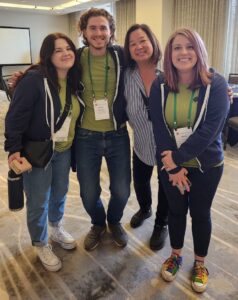
2024-25 Peer and Community Educator Fia Ewers, 2024 Student Voice and Resource Navigator Adam Matthews, Walter S. Johnson Foundation Program Director/Whittier Trust Philanthropic Services Vice President Yali Lincroft, and Fostering Success Initiative Manager Laura Obrist at October 2024 California College Pathways Blueprint for Success Conference, in Los Angeles



